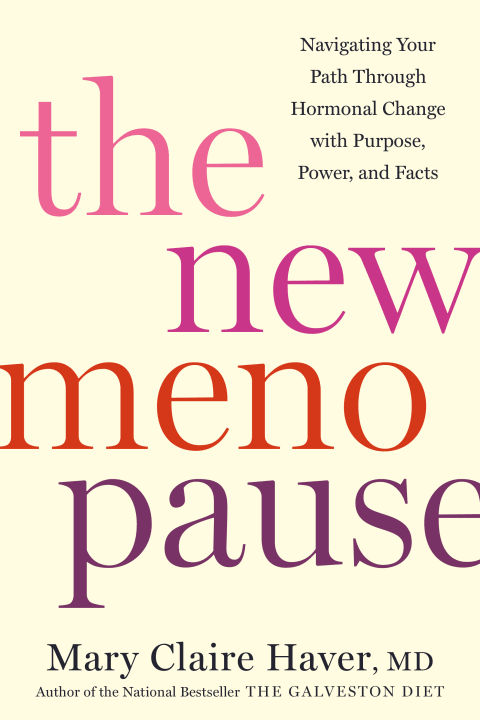Advertisement

Neuroinflammation is inflammation that occurs in the brain or spinal cord, and it can damage nerve cells essential to cognitive function. When neuroinflammation becomes chronic, the repeated damage can tangle up your brain's communication lines and potentially lead to the formation of the kind of plaque that's associated with Alzheimer's.

Women are twice as likely as men to develop Alzheimer's, which has long been attributed to the fact that women live longer than men and the risk of Alzheimer's increases as we age. But emerging research has found another contributing factor: the dramatic hormone changes we experience during the menopausal transition.
These changes, especially the loss of estrogen, can increase neuroinflammation and, according to neuroscientist Lisa Mosconi—director of the Women's Brain Initiative and of the Alzheimer's Prevention Program at Weill Cornell Medicine/New York-Presbyterian Hospital—accelerate the chronological aging in the female brain. It's this aging that can equal increased risk of Alzheimer's disease as women undergo menopause.
It's possible that estrogen decline is also the reason we are disproportionately affected by other cognitive-related diseases and disorders, such as multiple sclerosis (the autoimmune disease that attacks the brain and spinal cord), migraines, and major depressive disorder.
Know your risks
You are at increased risk of neuroinflammation if you have high blood pressure, high cholesterol, heart disease, and/or Type 2 diabetes. These conditions are pro-inflammatory and can directly compromise the health of your heart and blood vessels, which are responsible for transporting essential oxygen to your brain.
Your risk for Alzheimer's disease specifically increases as you age, and if you have had a sibling or parent diagnosed with the disease. Latinx and African Americans also have a higher risk of developing Alzheimer's.
Know your numbers
Nearly everyone who goes through the menopausal transition will experience an uptick in inflammation, including in the area of the brain. This is an inevitable consequence of the decline of estrogen, which I've already pointed out plays a crucial role in regulating inflammation. Estrogen is also essential to managing certain neurological functions. It's no wonder then that menopause can affect clarity of thought, concentration, calmness, and other brain-related abilities and behaviors.
Unfortunately, there aren't any approved or effective tests to check for neuroinflammation. But we can sort of nonscientifically measure our cognitive response to diminishing levels of estrogen by paying attention to the severity of brain-related symptoms of menopause. This can include symptoms like brain fog and forgetfulness and anxiety and depression.
Most women will experience some of these symptoms, to varying degrees. "This isn't surprising when you think about how many menopausal symptoms—including hot flashes, depression, anxiety, sleep disturbances, and even brain fog—actually stem from the brain rather than the ovaries," says Mosconi.
Generally, the symptoms will get better as estrogen stabilizes, and you'll establish a kind of postmenopausal norm (it's unlikely you will ever return to a premenopausal status quo). However, for some women, there will be a progression in the area of cognitive decline that may eventually lead to the diagnosis of dementia.
If you are at increased risk of Alzheimer's or other cognitive disease, I highly recommend that you read The XX Brain and The Menopause Brain, by Mosconi. She's an incredible resource for all matters related to menopause and cognitive health.
How MHT may help
There has yet to be a sweeping study saying that MHT is brain-protective for all women who are in or approaching menopause. But some research shows that it is effective for specific groups and not recommended for others.
As I mentioned in Chapter 4, research published in 2023 found that carriers of the APOE4 gene, which is associated with a higher risk of developing Alzheimer's disease, experienced improved memory recall speed and larger volumes in brain areas when taking hormone replacement therapy (when compared to nonusers).
Hormone therapy has also been shown to be significantly neuroprotective when used by women who had a bilateral oophorectomy (removal of both ovaries) prior to the age of 50 and somewhat protective in those who used MHT in the early menopausal stage, which is generally between the ages of 50 and 60.
However, women who began MHT in late menopause, defined as between 65 and 79, were shown to have increased risk of cognitive decline and dementia. This shows that, as with cardioprotection, the timing of MHT may be an important factor in determining whether it will be safe and/or effective for brain cells.
Watch Next
Enjoy some of our favorite clips from classes
Enjoy some of our favorite clips from classes
What Is Meditation?
Mindfulness/Spirituality | Light Watkins
Box Breathing
Mindfulness/Spirituality | Gwen Dittmar
What Breathwork Can Address
Mindfulness/Spirituality | Gwen Dittmar
The 8 Limbs of Yoga - What is Asana?
Yoga | Caley Alyssa
Two Standing Postures to Open Up Tight Hips
Yoga | Caley Alyssa
How Plants Can Optimize Athletic Performance
Nutrition | Rich Roll
What to Eat Before a Workout
Nutrition | Rich Roll
How Ayurveda Helps Us Navigate Modern Life
Nutrition | Sahara Rose
Messages About Love & Relationships
Love & Relationships | Esther Perel
Love Languages
Love & Relationships | Esther Perel
What Is Meditation?
Box Breathing
What Breathwork Can Address
The 8 Limbs of Yoga - What is Asana?
Two Standing Postures to Open Up Tight Hips
How Plants Can Optimize Athletic Performance
What to Eat Before a Workout
How Ayurveda Helps Us Navigate Modern Life
Messages About Love & Relationships
Love Languages
Advertisement

Research Calls Out Concerning Potential Side Effects Of Melatonin
Gretchen Lidicker, M.S.

This Supplement May Remarkably Benefit Those With A High Risk Of Alzheimer’s
Molly Knudsen, M.S., RDN

Research Calls Out Concerning Potential Side Effects Of Melatonin
Gretchen Lidicker, M.S.

This Supplement May Remarkably Benefit Those With A High Risk Of Alzheimer’s
Molly Knudsen, M.S., RDN

Research Calls Out Concerning Potential Side Effects Of Melatonin
Gretchen Lidicker, M.S.

This Supplement May Remarkably Benefit Those With A High Risk Of Alzheimer’s
Molly Knudsen, M.S., RDN

Want To Be Metabolically Healthy? Study Shows An Underutilized Approach
Molly Knudsen, M.S., RDN

Research Calls Out Concerning Potential Side Effects Of Melatonin
Gretchen Lidicker, M.S.

This Supplement May Remarkably Benefit Those With A High Risk Of Alzheimer’s
Molly Knudsen, M.S., RDN

Want To Be Metabolically Healthy? Study Shows An Underutilized Approach
Molly Knudsen, M.S., RDN














